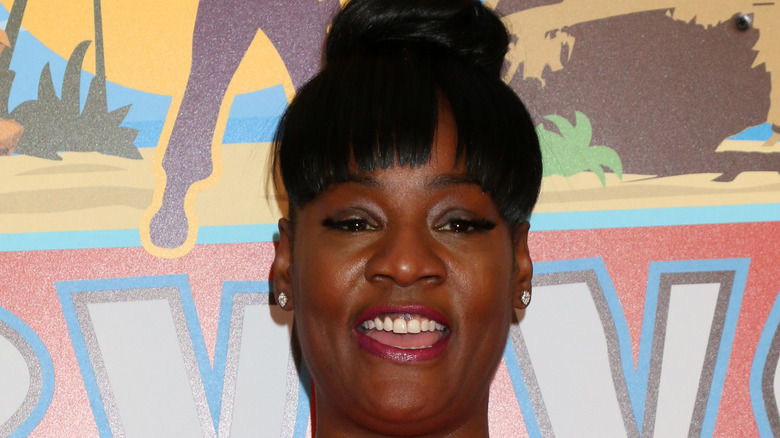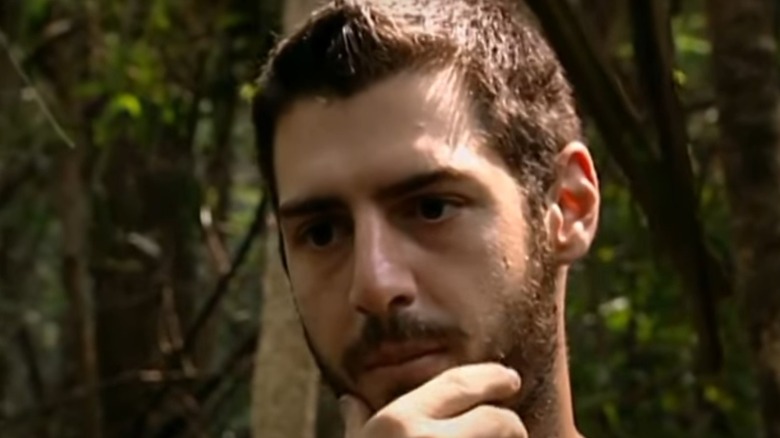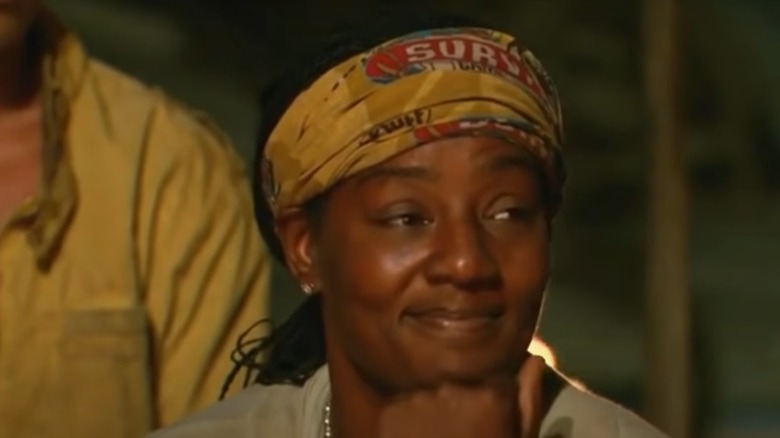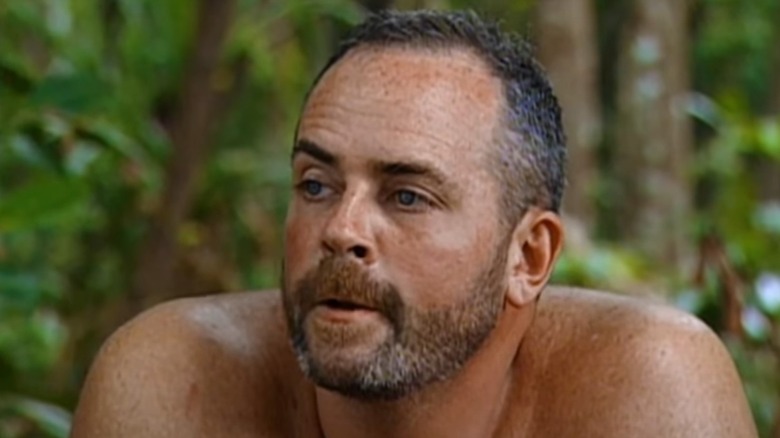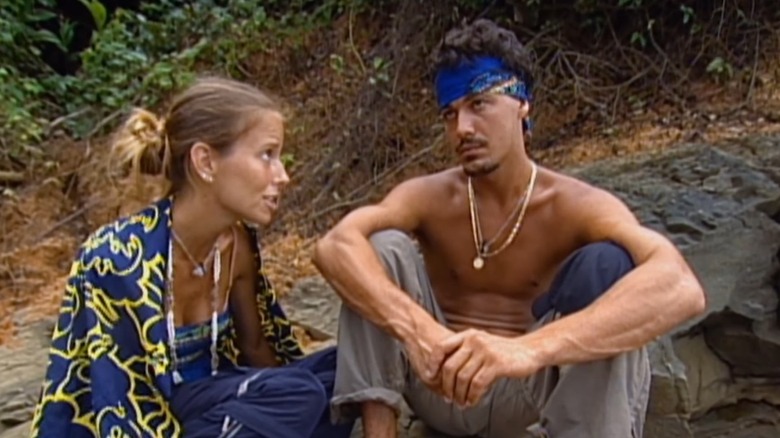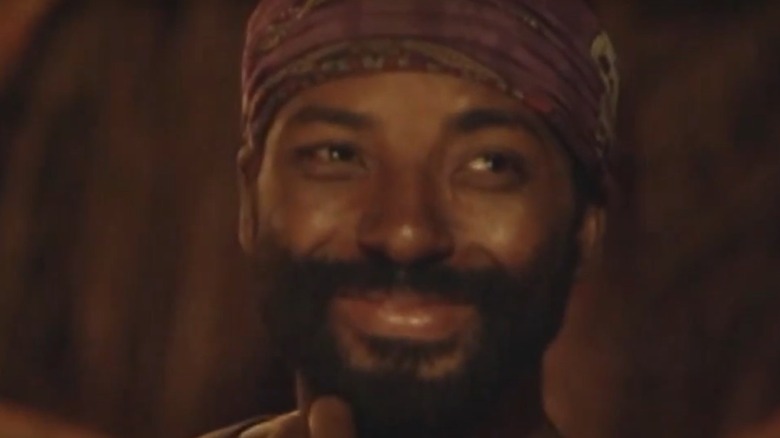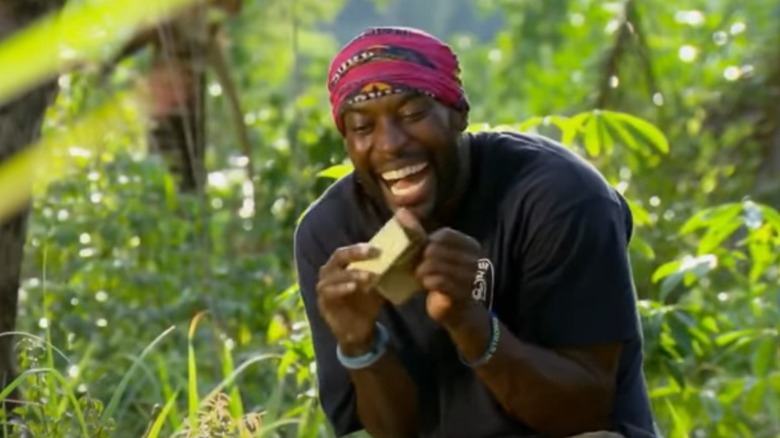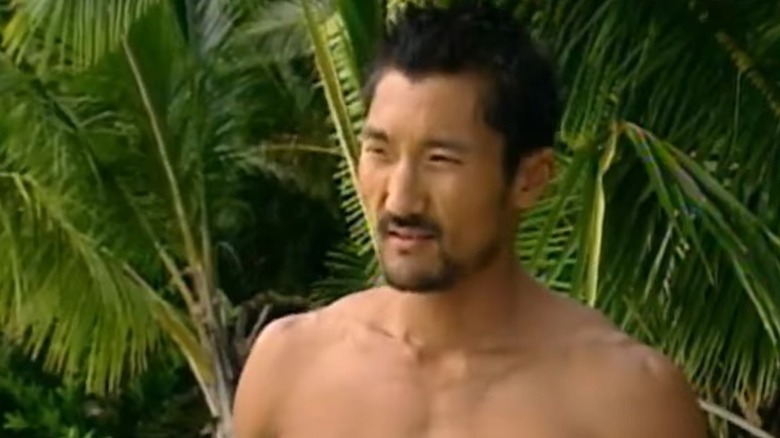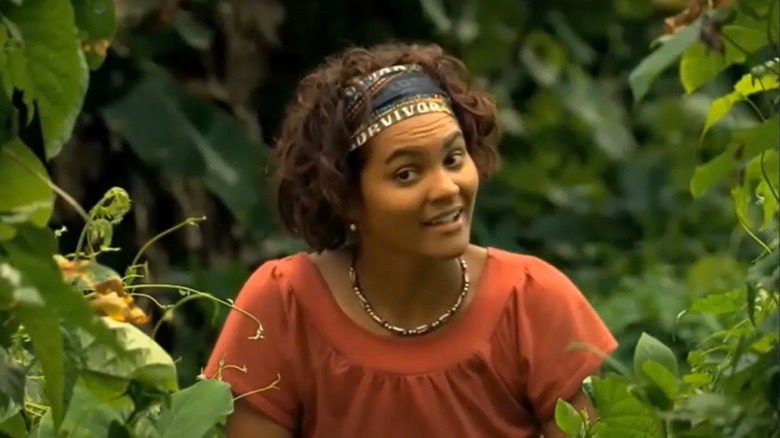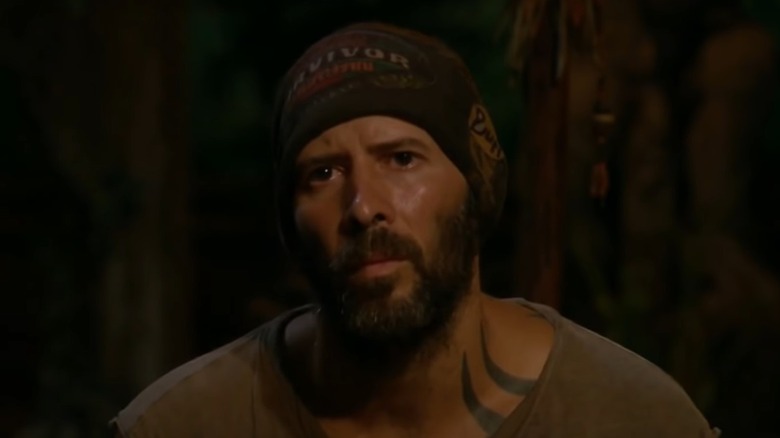The Best Survivor Contestants Of All Time Ranked
Over 600 people have competed on "Survivor," the CBS reality competition about a group of strangers stranded in a remote location and forced to work together for survival while also competing against each other to win $1 million. Players are initially divided into tribes and vote each other out if they lose immunity challenges, but later compete as individuals. Around 16-20 people vie for the prize each season, but only one gets the title of Sole Survivor. Those contestants are often considered the best players of their respective seasons, but even those who don't win can be considered some of the best.
After two decades and 40 seasons, "Survivor" is still going strong and still giving us memorable players with each new installment. With "Survivor 41" currently airing and ushering in a new era of the show, here is a look at some of the best players from the first 40 seasons ranked based on their overall gameplay and how effective they were on their season(s).
Rob Cesternino
The first few seasons of "Survivor" were the show at its most compelling, as both the series and the contestants on it were still figuring out how the game should be played. Season 6, "Survivor: The Amazon," was the first to divide the tribes based on a theme. In this case, it was men vs. women. This was also the season to introduce fans to Rob Cesternino, a prominent figure within the "Survivor" community and one of its best former players.
A strong competitor right out of the gate, Rob was able to play nearly every side of the game and formed multiple alliances in order to get anyone to do what he wanted. Some of his most memorable moments include helping to blindside his former ally Deena Bennett and orchestrating a counter-alliance to take out swing vote Christy Smith for refusing to pick a side. Though he lost the season in the end to equally strong competitor Jenna Morasca, Rob Cesternino's funny personality and cutthroat gameplay made him one of the best players in "Survivor's" early years. Nowadays, Rob hosts his own reality show-themed podcast.
Amanda Kimmel
No matter how many challenges you win or how many people you blindside, getting to the end of the 39 (or this current season's 26) days and the Final Tribal Council is the most important aspect of "Survivor." Amanda Kimmel was the first person to accomplish this twice, as well as the first to do so in back-to-back seasons.
Her first season, "Survivor: China," saw her play a strong and loyal game, and even help orchestrate the blindside of her friend James Clement when he became too powerful after he acquired two Hidden Immunity Idols (items that negate votes against a player at Tribal Council). Her second season, "Survivor: Micronesia — Fans vs. Favorites," was another solid showing when she joined the Black Widow Brigade, one of the best all-female alliances in the show's history, and helped them dominate the game. She even saved herself from elimination by playing her own Hidden Immunity Idol when she was in danger. The only time she was ever voted out was in her third season, "Survivor: Heroes vs. Villains," finally leaving the game after 108 days of play.
Add in several individual Immunity Challenges, and Amanda is one of the most well-rounded players, excelling both physically and mentally.
Cirie Fields
The story of Cirie Fields is one filled with amazing highs and extreme lows. Across four seasons and over 120 days of gameplay, Cirie has established herself as one of "Survivor's" biggest success stories, despite never getting to the Final Tribal Council.
During her first two seasons, "Survivor: Panama" and "Survivor: Micronesia — Fans vs. Favorites," Cirie used her social skills to take control of the game late in the merge phase. Her first season saw her go from the bottom of her tribe to making several major strategic decisions. Her second season gave her even more influence over the game, becoming one of the biggest contributors to the Black Widow Brigade alliance and leading the charge in orchestrating the blindside of Erik Reichenbach, which is still widely regarded as one of Survivor's best blindsides. While her third season, "Survivor: Heroes vs. Villains," was short-lived, her fourth run on "Survivor: Game Changers" saw her play a more backseat — but also more effective — game.
Since "Heroes vs. Villains" is the only season she didn't make the top six, it's easy to see why Cirie is considered one of the best players to never win.
Richard Hatch
When talking about "Survivor" winners, you can't gloss over the first person to ever become the Sole Survivor. All of the gameplay that occurred in later seasons wouldn't have been possible without Richard Hatch. Entering the inaugural season "Survivor: Borneo" confident he would win the million dollars on the first day, Richard was the architect of the first-ever alliance. Gathering together all of his closest friends to form a voting block that would control the votes, Richard ran strategic circles around the younger and less savvy players while also controlling his alliance on the side.
While older seasons like "Survivor: Borneo" might not be as exciting as the seasons that come later, Richard's win is important in that he was able to effectively control everything that was going on without any of the extra advantages and flourishes that have come to define the current "Survivor" game. While Richard's win is still deserved, a string of controversies, including an alleged assault on "Survivor: All Stars," has left a stain on his legacy.
If you or anyone you know has been a victim of sexual assault, help is available. Visit the Rape, Abuse & Incest National Network website or contact RAINN's National Helpline at 1-800-656-HOPE (4673).
Rob Mariano
Richard Hatch only played the game twice, on the first season and on "Survivor: All-Stars." On the flip side, "Boston" Rob Mariano has made six appearances on the show: five times as a competitor and once as a mentor on "Survivor: Island of the Idols." After making a decent but ultimately ineffective run on his first season, "Survivor: Marquesas," Rob returned for "Survivor: All-Stars" and played one of the most cutthroat games ever by backstabbing his real-life friends with little to no remorse, which would ultimately cause him to lose against his future wife Amber Mariano.
Rob's "Survivor" career would later be defined by his rivalry with Russell Hantz, one of the show's nastiest villains. While Russell would eventually beat Rob in "Heroes vs. Villains," Rob would get his revenge in his winning season "Survivor: Redemption Island." From day one to the very end, Rob dominated "Redemption Island" and ruled over the game with an iron fist, cruising to an easy win.
Earl Cole
It took Rob Mariano four tries to become Sole Survivor. However, it only took "Survivor: Fiji" winner Earl Cole one try to win. And his win came with a very impressive first: Earl was the first person in the history of the show to win the game by unanimous vote, as every member of the jury voted for him to win. Also significant is that Earl was the second African American person to ever win the game, after "Survivor: Marquesas" winner Vecepia Towery.
Earl's win was definitely deserved, as he was able to overcome being on a losing tribe by leveraging his strong alliance with fan favorite Yau-Man Chan to build strong relationships with others and use them to destroy the original majority alliance and control the endgame. Despite betraying Yau-Man at the end, this move would ultimately prove to be one of the defining moments that secured him the win in the end.
Jeremy Collins
After Earl's win, it would be another 17 seasons before another Black player would become the Sole Survivor. That honor went to "Survivor: Cambodia" winner Jeremy Collins, who also followed in Earl's footsteps and won by unanimous jury vote. After failing to win during his first season on "Survivor: San Juan Del Sur" where he got blindsided by his own allies, Jeremy returned on "Cambodia" and played a much stronger game.
In a season filled with multiple twists and tribe swaps, Jeremy was able to successfully hide behind bigger threats in the game as shields and use them to control several votes in order to get his real targets out of the game before coming after his shields. He also found several Hidden Immunity Idols and used them to his strategic advantage. Despite being a massive threat to win himself, Jeremy's strong alliances and strategic gameplay were enough to control nearly the entire season.
Yul Kwon
Everyone loves an underdog story, and "Survivor" is full of them. In "Survivor: Cook Islands," an alliance known as the Aitu Four was outnumbered 8-4 near the midpoint of the season. Despite this, the group emerged victorious and dominated the rest of the game. The leader of this alliance was Yul Kwon, who eventually ended up becoming the first Asian American winner in the show's history.
In addition to his natural leadership skills, Yul's discovery of the season's Hidden Immunity Idol was key to his success, as he was able to use the Idol to sway others to his side and tilt the game in his favor. But even before that, Yul proved himself to be a cutthroat player when he blindsided his alliance member "Cao Boi" Bui before the merge after he came up with the first-ever "split vote" strategy, which was the act of casting the same number of votes on two targets so one can go home if an Idol is played.
By getting rid of him, Yul was able to eliminate any strategic force that could upend his control.
Kim Spradlin-Wolfe
"Survivor: One World" is often considered one of the show's worst seasons, but even its detractors agree that the season's winner, Kim Spradlin-Wolfe, is one of the show's most dominant players. From the start of the game, Kim showed a gift for maintaining strong alliances while excelling in team challenges to keep herself safe.
But it wasn't until the merge that her game truly shined. In a season originally divided by men vs. women, Kim formed an all-female alliance to get an advantage over her dysfunctional male contestants to take control of the game. At the end, Kim went on an Individual Immunity Challenge winning streak to make sure she was never in danger of leaving while also controlling the fates of her alliance members. All of these allowed Kim to sail to the Final Tribal Council and secure one of the easiest wins that fans have ever seen.
Parvati Shallow
Before Kim's all-female alliance in "Survivor: One World," there was the Black Widow Brigade of "Survivor: Micronesia — Fans vs. Favorites." This alliance was formed by Parvati Shallow, a contestant previously from "Survivor: Cook Islands" looking to play a smarter game the second time around. After winning her way to the merge, Parvati rallied most of the other women together to pull off a string of blindsides that helped launch her to the finals.
Almost as impressive was Parvati's third run on "Survivor: Heroes vs. Villains." Despite being an outsider at the start on the Villains tribe, Parvati's alliance with Russell Hantz and her dominance in Individual Immunity Challenges kept her alive in the game. Her crowning moment during that season was when she played two Hidden Immunity Idols on her allies, destroying the Heroes' alliance and taking control of the game. These moves propelled Parvati to the final again, though she wasn't able to secure the win on that season.
Sandra Diaz-Twine
Instead, the winner of "Survivor: Heroes vs. Villains" was Sandra Diaz-Twine, the first and currently only woman to ever win "Survivor" twice. The first time Sandra won was on her original season "Survivor: Pearl Islands," which saw her use her social skills to take strategic control of her original tribe. Despite losing many allies as the game went on, her enemies underestimated her due to her physical weaknesses, and she was able to manipulate them into taking her all the way to the end and winning it all.
Sandra's "Heroes vs. Villains" story is somewhat similar. She started strong but lost allies near the midpoint. Letting her former enemies underestimate her into thinking she's easy to beat allowed Sandra to outmaneuver them and secure the final vote. While her undefeated record would end when she returned for later seasons, Sandra is still considered the Queen of "Survivor" to this day.
Tony Vlachos
When you first meet Tony Vlachos in "Survivor: Cagayan," his frantic gameplay and eccentric personality might not sound like a winning formula. But underneath all the flash was true strategy, as Tony was able to blindside both enemies and allies without caution while also finding Hidden Immunity Idols to secure near-total control of the entire season.
After playing such a strong game his first time, and fumbling during his second turn on "Survivor: Game Changers," Tony would return alongside 19 other Sole Survivors to celebrate the show's 40th season with "Survivor: Winners at War." In this season, Tony was able to employ some of the same tactics that won him his original season. These included building "spy shacks" to eavesdrop on other people's conversations and finding Idols to use to his strategic advantage.
While Sandra's second win was impressive, Tony's second victory over 19 other winners (including previously listed "Boston" Rob, Jeremy, Yul, Kim, Parvati, and Sandra) is truly remarkable. This easily makes Tony the "King" to Sandra's "Queen."
